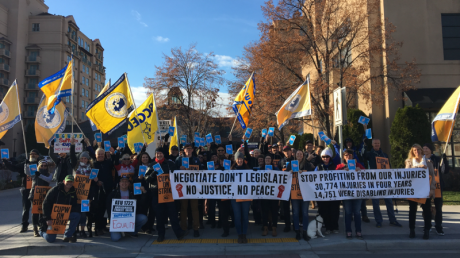Features
You are here
Reviving lost labour traditions

January 17, 2019
As we begin 2019, we see the incredible polarisation between left and right around the world. There is the growth of the hard right in countries like Hungary, Austria, Poland and the election of Bolsinaro in Brazil. The tragic attack on Jewish worshippers in Pittsburgh horrified people everywhere by the depth of anti-semitism, which goes hand in hand with Islamophobia, anti-Black racism, homophobia and bigotry of all sorts.
But we are also seeing working people and the poor in all their diversity rising up in local and national struggles. In British Columbia, Indigenous people are making a courageous stand on Unist’ot’en lands against a new pipeline project. Trade unionists and other supporters occupied Liberal MPs’ offices and blockaded postal plants across the country in solidarity with the Canadian Union of Postal Workers (CUPW), and we have witnessed the gilets jaunes or “yellow jackets” who took to the streets across France proclaiming that enough is enough, and they will no longer be treated with continuing and profound disrespect, as the rich get richer.
The intensifying attacks by neoliberal governments and corporations have been creating an incredible volatility. Fear and anxiety for the future are being felt by so many. Parties of the centre are no longer drawing the support they garnered in the past and so many are looking for alternatives.
As a friend from Paris said, “the yellow jackets are amazing: ordinary people, not amongst the “poor” but just above, who are tired of taxes the end of which they never see, and all these families with two earners can’t even buy gifts for their children’s Christmas. They want the law that suppressed taxes for the very rich to be annulled, among other things…They hate Macron, his arrogance, his contempt for them…so do I.” 84% of the French people support them. This speaks to a demand for something fundamentally different.
Trying to take advantage of this sentiment, white nationalist Steve Bannon, formerly an adviser to Donald Trump, is speaking internationally and has set up a headquarters in Belgium to co-ordinate the growing movements of the hard right in the lead-up to May elections to the European Parliament. 1500 people demonstrated against him when he spoke recently in Toronto, and local trade-unionists and community members are organizing against this move toward bigotry.
But as a Greek anti-fascist, anti-racist organizer I heard speak at a recent conference said, “They can be defeated. A number of years ago the Golden Dawn (a neo-Nazi organization) had seventy-six centres across Greece. Now there are only ten and they are no longer attacking immigrants and refugees in the streets.” This is because both local and national united fronts of trade unionists, anti-racist groups and organized socialists worked together and were able to build strong popular support against them.
These struggles are taking place all around us. When people start fighting back as the postal workers did in late 2018, it was critically important that cross-union solidarity erupted across the country when they were legislated back to work. This is a tradition the labour movement has lost, and we have to start standing in solidarity whenever people are fighting. College faculty won their demands following a cross-Ontario strike in 2018 because of their militancy and the support of students, other trade unionists and campaigns such as the Fight for $15 and Fairness.
When anti-semitism, Islamophobia or racism show themselves as happened horrifically at the synagogue in Pittsburgh or the mosque in Quebec City – where Jewish people and Muslims were shot and killed by bigots emboldened by a right-wing movement – we have to stand up and say no to this hate. There is a struggle going on worldwide between the forces of the left and the right, and the intervention of organized socialists can make a difference giving hope that a better world is possible.
Section:










